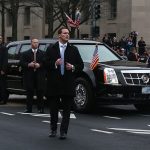Akio Toyoda, Chairman of Toyota Motors, recently dropped some truth bombs that could shake up the electric vehicle (EV) conversation in the U.S. His take on the Biden administration’s ambitious push for electric vehicle mandates is as blunt as a two-by-four; he argues that such a drastic shift will ultimately jeopardize jobs—not just in America, but all the way across the Pacific in Japan. This isn’t just about Toyoda protecting his turf; it’s about a broader warning sign for an industry that seems hell-bent on chasing electric dreams without a detailed road map.
The Biden administration aims for 50% of new vehicle sales to be electric by 2030 and an astonishing 67% by 2032. In Toyoda’s eyes, this ambitious target is about as realistic as expecting a cat to perform calculus. After all, his own company has been pivotal in the hybrid market, selling nearly half of all hybrid electric vehicles just last month. Does it sound like the chairman is having a change of heart toward gas-powered vehicles? You bet it does. His preference for good old-fashioned combustion engines not only reflects consumer desires but also a survival instinct for those involved in the automotive sector.
Automotive Jobs at Risk Amidst Growing EV Popularity, Warns Toyota Chairmanhttps://t.co/uA8RN66PpO#Electricvehiclejoblosses #Toyotawarning #AikidoToyoda #Automotivejobs #Sustainabilitythreat #IW #IWNews #IndustryWired pic.twitter.com/LfVQ0KqLPp
— IndustryWired (@industry_wired) October 10, 2024
Toyoda highlighted a staggering figure: 5.5 million individuals are involved in the automotive industry in Japan. Many of them have been perfecting their craft in engine-related roles for decades. The prospect of shifting entirely to electric vehicles raises a real concern about jobs being lost. If suppliers and engine manufacturers find themselves pushed to the margins just because the government demands an EV-obsessed future, the ramifications for workers could be grim. Sounds like the White House might need to take a crash course in job creation 101, because they’re on a fast track to disaster.
Meanwhile, while the Biden administration talks a big game about expanding EV infrastructure, the reality on the ground tells a different story. With a goal of 500,000 new charging stations by 2030 and only eight stations built in the last two years, one has to wonder if the Transportation Department has mastered the art of procrastination. With $7.5 billion allocated for this endeavor, it seems that spending money and actual execution are two very different concepts in Washington. Maybe the federal government should leave the driving to the professionals rather than taking the wheel themselves.
Interestingly, Toyota is no slouch in the EV market. They reported that over one-third of their first-quarter sales consisted of electric models, which is a whopping 74% increase from the previous quarter. Yet, even with all that progress, those cars still account for less than a tenth of total sales. If the government wants to force everyone into electric vehicles, they might need to consider that the market has other opinions—like the fact that consumers still prefer their reliable gas guzzlers, at least for now.
In the great vehicle debate of our time, both job security and consumer choice hang in the balance. The rush to electrification, while fashionable among some policymakers, could lead to a bumpy ride—one that leaves millions of hardworking individuals stranded and without means of making a living. Perhaps it’s time to hit the brakes on overzealous mandates and find a more balanced approach that benefits everyone, rather than pushing a one-size-fits-all agenda that fits no one.




